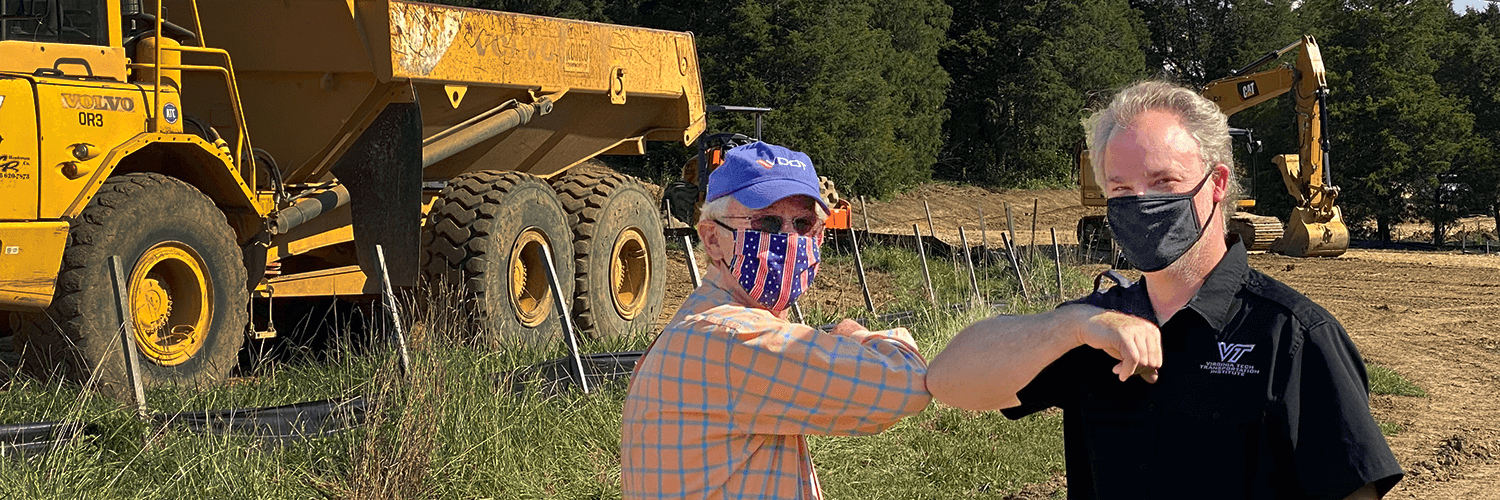
Partnerships
Sponsors, affiliations and programs
VTRC operates in a complex environment of national, state, local and private organizations and programs devoted to advancing transportation. A list of some of the most prominent partners we are involved with can be found below.
VTRC is division of the Virginia Department of Transportation (VDOT). This is beneficial to VDOT because VTRC’s staff and management have a detailed knowledge of VDOT and its mission, people and processes. VTRC’s research program is predominantly focused on the needs of VDOT’s operating units and districts, as articulated primarily through VTRC’s advisory committee structure and contacts with VDOT personnel.
VTRC is supported by the Federal Highway Administration (FHWA). This longstanding, close working relationship with the agency encompasses several federal programs, funding arrangements, administrative processes and cooperative activities. FHWA Virginia Division personnel serve on each of VTRC’s research advisory committees and often as technical advisors on project technical review panels for research efforts.
VTRC is affiliated with UVA’s Center for Transportation Studies (CTS) which was established at U.Va. to provide focus for the existing academic program and research activities and to lay the groundwork for further growth.
The CTS is housed in the Engineering Systems and Environment Department on the U.Va.'s grounds. The CTS makes use of VTRC’s resources, labs and library. The CTS also conducts Virginia’s Local Technical Assistance Program (LTAP) under contract with VTRC and conducts additional professional development activities through its Transportation Training Academy (TTA).
VTRC also has a strong relationship with Virginia Tech, primarily through its oversight of VDOT’s Smart Road in Blacksburg. The Virginia Tech Transportation Institute (VTTI) uses the Smart Road for research to make tomorrow’s drivers, vehicles and highways safer.
The Virginia Tech Transportation Institute (VTTI) is one of seven research institutes at Virginia Tech and serves to increase knowledge on transportation issues and affect public policy, not only in Virginia but globally.
VTRC supports participating institutions in the USDOT-sponsored University Transportation Centers (UTC) program. This Congressionally-mandated program addresses the need for the safe, efficient and environmentally sound movement of people and goods.
Through this program, a consortium of universities come together for form a UTC of transportation excellence on a specific topic. The number of UTCs funded during a given period has increased since the program began in 1988. Three levels of UTCs exist: national, regional and tier 1. Annually, VTRC provides matching state funds to participating Virginia universities.
VTRC is an active participant in and supporter of the Transportation Research Board (TRB) and its many activities and programs. The TRB brings scientific and technical knowledge to bear on transportation problems by encouraging and conducting research and disseminating information.
VTRC staff members frequently serve as members and officers on TRB’s technical committees and present research results at TRB-sponsored meetings and conferences. The Director of Research and Innovation is the designated state representative to TRB for Virginia.
VTRC’s Director of Research is a member of the American Association of State Highway and Transportation Officials’ (AASHTO) Southeastern Region (Region II) Research Advisory Committee. In this capacity, the Director serves as a liaison with counterparts in the other states in AASHTO Region II.
In addition, the VTRC Director of Research and the research directors from all other state transportation agencies are members of the AASHTO National RAC that advises the AASHTO Special Committee on Research and Innovation (R&I). Among other things, R&I determines the direction and content of the National Cooperative Highway Research Program (NCHRP).
VDOT supports the Cooperative Research Programs administered and staffed by the Transportation Research Board (TRB), including the National Cooperative Highway Research Program (NCHRP.) The NCHRP is an applied research program directed toward highway-related problems of broad national interest that are selected by AASHTO committees on behalf of the member states.
VDOT annually contributes a share of its state planning and research apportionment to support TRB’s Cooperative Research Programs Division, including NCHRP. VTRC staff members frequently sit on NCHRP review panels and participate in the NCHRP annual problem statement solicitation and prioritization process.
VTRC often contracts or undertakes research cooperatively with faculty researchers at other universities and colleges to accomplish program objectives. These agreements are solicited by an open competitive process and are entered into when:
- a specific need for expertise is identified.
- specialized testing facilities are needed.
- additional staff resources are needed to address workload demands.
In addition, faculty from some of the leading engineering graduate studies programs in Virginia participate in the activities of VTRC’s research advisory committees.
The FHWA Transportation Pooled Fund Program (TPF) is a collaborative program that has existed for more than 45 years. The TPF program creates an opportunity for partners to pool their funds, subject matter expertise and resources to conduct high-priority research to meet a wide variety of shared transportation problems. Being able to pool funds allows participants to get more out of a study than if they conducted a study on their own. There are hundreds of active pooled fund studies, to help assist partners in finding and funding projects applicable to their agency’s needs.
VTRC frequently contributes to and participates in pooled fund studies led by other states (and FHWA). In addition, VTRC often serves as a pooled fund study lead state when a research need is identified of regional or national interest.
VTRC staff members participate in major national transportation industry and research technical societies and conferences, often serving as committee chairs, presenters or subject matter experts.
Some of these organizations include:
- American Society for Testing and Materials
- American Concrete Institute
- American Concrete Paving Association
- National Safety Council
- Accreditation Board for Engineering and Technology
- American Society of Civil Engineers
- Association of Asphalt Paving Technologists
- Association for Materials Protection and Performance
- American Society of Nondestructive Testing
- Institute of Transportation Engineers
- Intelligent Transportation Society of America,
- state and local historical societies and associations
Last updated: February 12, 2026

